To this day, many merchants are still struggling to choose the best eCommerce platform for their businesses. Many top names have been put under debate, and among them, Shopify vs Salesforce Commerce Cloud proudly stand out.
To help you decide between the two, I have created stores on both platforms and observed their performances! In this article, I will cover:
- An overview of both platforms, including their pros and cons
- A comparison of 9 key aspects of Shopify vs Salesforce Commerce Cloud
- Answers to common questions
An Overview Of Shopify vs Salesforce Commerce Cloud
About Shopify pros and cons

It's safe to say that even those new to the eCommerce world have probably heard of Shopify! As one of the biggest eCommerce platforms worldwide, it's designed to help businesses of all sizes launch, manage, and grow their online stores.
At the time of our writing, around 8 million websites are using Shopify. Its popularity results from many impressive benefits, though it also does have some downsides to consider.
SHOPIFY PROS | SHOPIFY CONS |
Simple and intuitive interface, easy sign-up and setup | Starter plan is cheap but with limited options/features |
No transaction fees for Shopify Payments | Some features require additional apps and extra spending |
210 customizable themes (both free and paid), tailored for specific industries | Shopify Payments is only available in 14 countries, with high transaction fees for third-party gateway |
8000+ free and paid apps, categorized for easy discovery | No email hosting (requires third-party hosting) |
Supports on-page and off-page SEO + offers built-in marketing tools | Complicated account termination process |
Hosted platform with advanced security, with high availability for global access | |
24/7 customer support with Help Center, Community Forum, live chatbot |
About Salesforce Commerce Cloud pros and cons

Like Shopify, Salesforce Commerce Cloud is a huge cloud-based platform that helps shop owners manage their online stores. The only key difference is that Salesforce Commerce Cloud operates on a multi-tenant architecture, meaning all users share the same infrastructure and code base.
Since its release, this platform has provided tools and features for all the main aspects of running an online business – from setting up the storefront to managing inventory and fulfilling orders. It also uses AI to personalize customers' shopping experience or recommend products they are likely interested in.
As of our writing, over 12,000 websites have been using Salesforce Commerce Cloud, another proof of its growing popularity!
On another note, you should remember that there is a difference between the core Salesforce platform and Salesforce Commerce Cloud. Salesforce is primarily known for its Customer Relationship Management (CRM) software; meanwhile, Commerce Cloud is a separate platform specifically designed for eCommerce.
Now that we have discussed what Salesforce Commerce Cloud offers, let’s move on to a quick overview of its advantages and downsides:
SALESFORCE COMMERCE CLOUD PROS | SALESFORCE COMMERCE CLOUD CONS |
Can handle growth and demand spikes | Very expensive for small businesses, with high TCO |
Strong visual merchandising tools, promotion tools and product support | Complex setup and customization; integration with 3rd-party tools is not always smooth |
Multi-store setup (price, product, theme, merchandising, etc.) | Universal updates that might not meet individual needs |
Shopify vs Salesforce Commerce Cloud 2024: 9 Quick Comparisons
Before writing this article, I spent three months using both platforms and evaluating their features. In a comparison based on nine criteria, Shopify emerged as the better choice – though the victory was quite close. Specifically, Shopify won in five categories, Salesforce Commerce Cloud won three, and one resulted in a tie.
Here's a more detailed breakdown of the Shopify vs Salesforce Commerce Cloud battle:
FEATURE | SALESFORCE CC | SHOPIFY | WINNER |
Pricing | Contact for quote, varies based on business needs | Four predefined packages | Shopify |
Ease of Use | Requires technical proficiency | User-friendly, drag-and-drop interface | Shopify |
eCommerce Features | Advanced capabilities; AI and rules-based order routing; Global inventory management | Real-time inventory management; Detailed order tracking; Automated fraud detection | Shopify |
SEO & Marketing Features | Comprehensive AI-powered personalization; Advanced segmentation; Integrated analytics | Basic SEO tools; Automated email templates; Relying on third-party apps for advanced features | Salesforce Commerce Cloud |
Scalability | Designed for large enterprises with expert scalability options | Seamless integration; Extra costs for third-party apps | Salesforce Commerce Cloud |
Templates | Extensive customization options, requiring some expertise | Vast selection of pre-made themes, easy customization for beginners | Shopify |
Apps and Plugins | Over 7,000 apps, ready to install | Over 8,000 apps, user-friendly | Tie |
Customer Support | 24/7 support only for higher plans | 24/7 live chat and email support for all plans | Shopify |
Security | Full compliance with CCPA and GDPR, robust data encryption | 2 security incidents in 2024 | Salesforce Commerce Cloud |
1. Pricing (Shopify wins)
First, let's look at the most important factor: pricing.
It is pretty clear Salesforce Commerce Cloud vs Shopify have quite different pricing models. Shopify operates on a subscription basis, offering four predefined plans you can pay monthly or annually. On the contrary, Salesforce Commerce Cloud requires potential users to contact them directly for a personalized pricing quote.
Shopify pricing
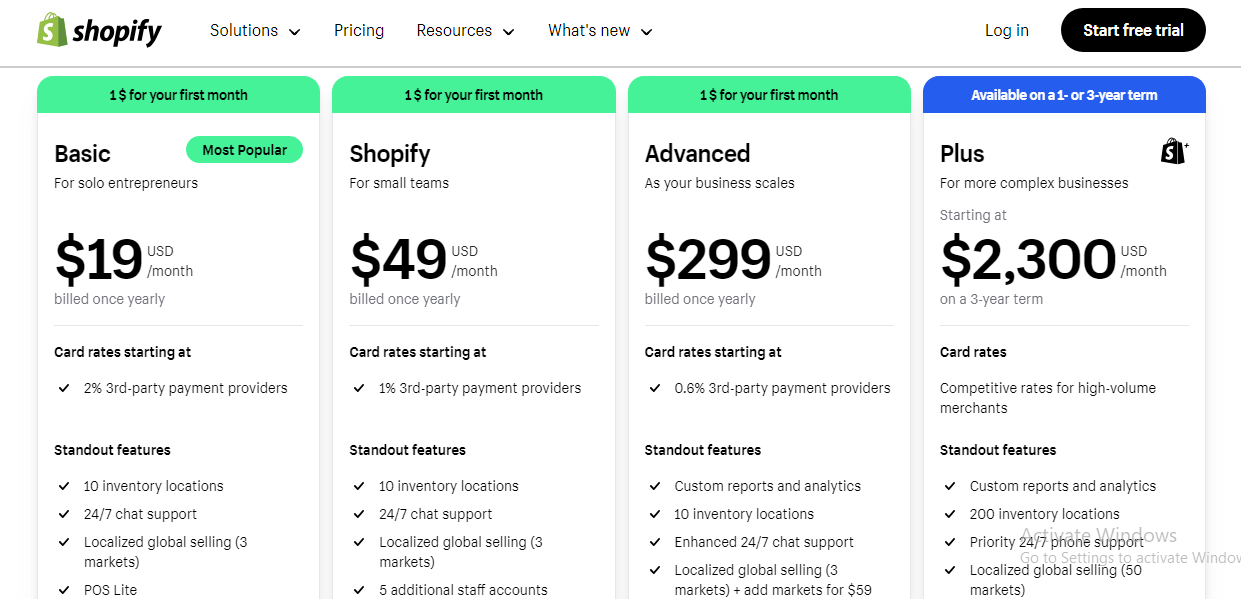
As of this writing, Shopify offers four hosted platform options (each with a monthly subscription model) to cater to different stages and styles of online businesses:
- Shopify Basic (for solo entrepreneurs): 19$/month
- Shopify (for small teams): $49/month
- Advanced Shopify (as your business scales): $299/month
- Shopify Plus (complex, enterprise-level needs): Starting at $2,300/month.
Salesforce Commerce Cloud pricing

So how about Salesforce Commerce Cloud pricing?
As we briefly mentioned earlier, this platform mainly targets larger enterprises with a customized pricing model. That means the cost varies significantly based on the business's specific requirements, sales volume, and the level of customization needed.
For your reference, here are three packages that Salesforce Commerce Cloud offers by 2024, all starting at 1% gross merchandise value:
- B2B Commerce
- B2C Commerce
- D2C Commerce
Also, you'd have to pay an additional 1% GMV/order to unlock Salesforce's order management features or launch B2B and D2C Commerce channels.
The Verdict
Shopify takes the lead. Most of its plans (except for Shopify Plus) are affordable since they target solo entrepreneurs and small- to mid-sized teams.
Need Help To Migrate To Shopify?
If you are intending to migrate your store to Shopify , LitExtension offers a great migration service that helps you transfer your data from the current eCommerce platform to a new one accurately, painlessly with utmost security.
2. Ease of use (Shopify wins)
Here's another essential criterion to consider: ease of use. I will evaluate how quickly new users, especially those without prior eCommerce experience, can navigate and understand the platform's features.
Shopify user experience

In this regard, Shopify stands out! The platform caters especially to those without technical backgrounds. Thanks to its drag-and-drop interface (which simplifies adding products, managing inventory, and fulfilling orders), the overall store management is very straightforward.
Salesforce Commerce Cloud user experience

On the flip side, Salesforce Commerce Cloud demands a certain level of technical proficiency for setup and ongoing management. Let's take the checkout process or integrating complex third-party applications, for example. Unless you have decent coding knowledge, these tasks can be quite challenging and often require extra assistance from a developer.
The Verdict
Shopify wins big. Salesforce Commerce Cloud offers extensive documentation, but its complex setup and customizations might discourage many non-technical users.
3. eCommerce features (Shopify wins)
Although pricing and ease of use (which we have discussed above) play a considerable role, eCommerce features are what truly matters for an eCommerce platform! In this section, we'll compare Shopify vs Commerce Cloud key selling features, detailed as follows:
Product and order management
In terms of product and order management, Shopify once again excels. It offers:
- Real-time inventory management across different locations
- Detailed order tracking for both customers and merchants
- Automated fraud detection
- Integrated shipping and fulfillment solutions (label printing included),
- Easy process for handling returns, refunds, and exchanges right from the dashboard
Still, I must say Salesforce Cloud Commerce's advanced capabilities give it an advantage in this comparison. Aside from the basic functions similar to Shopify, it also offers:
- AI and rules-based order routing for more efficient fulfillment
- Cross-channel order management (online and in-store)
- Global inventory distribution and order orchestration
CRM
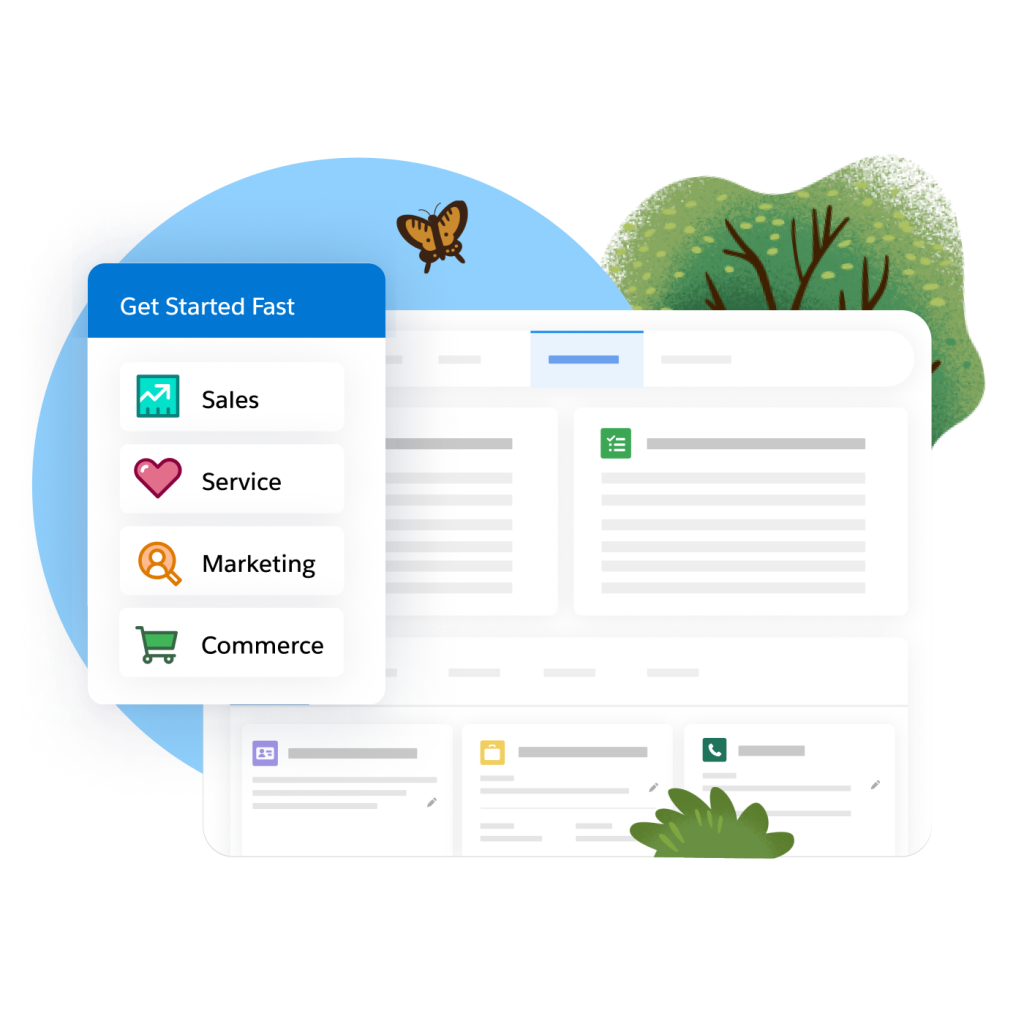
When it comes to Customer Relationship Management (CRM), it's understandable why many are impressed with Shopify.
This platform provides customer profiles with order history, contact details, and notes so you can easily segment your customers for targeted marketing. Order-related communications (like confirmation emails and tracking info) are a breeze to handle, and you can integrate your store with third-party CRM apps anytime you want. Just go to the Shopify App Store and browse your desired apps from there!
Nevertheless, impressive though Shopify might be, Salesforce Commerce Cloud once again steals the spotlight.
Specifically, when integrated with Salesforce CRM (the core platform we mentioned earlier), it offers a complete 360-degree view of the customer. Not only can you categorize your demographics in minutes, but you will also gain deep insights into sales and marketing patterns. There are even powerful tools for customer analytics and sales forecasting to enrich your experience!
Point of Sale (POS)
Regarding POS, I had quite a great experience with Salesforce Commerce Cloud.
Sales associates can assist customers anywhere on the shop floor, and its in-depth reporting and analytics provide great insights into customer behaviors and store performance. When paired with the right hardware and peripherals, it will reward you with a convenient centralized management of customer engagement, orders, and returns.
Nevertheless, my biggest problem with Salesforce Commerce Cloud POS is that you will have to integrate it into your store using third-party software. Sometimes, hiring a developer for this step is also required!
Hence, Shopify came out as the winner of this round. All of its features and mobile apps are entirely native, and if desired, you can even buy the necessary hardware from Shopify stores themselves. Many big enterprises have utilized this Shopify feature as a result; one famous example is the classic Red Bull brand. It used POS features (+ other reporting tools) to track customer behavior and adjust its marketing campaigns accordingly.
Payment Options
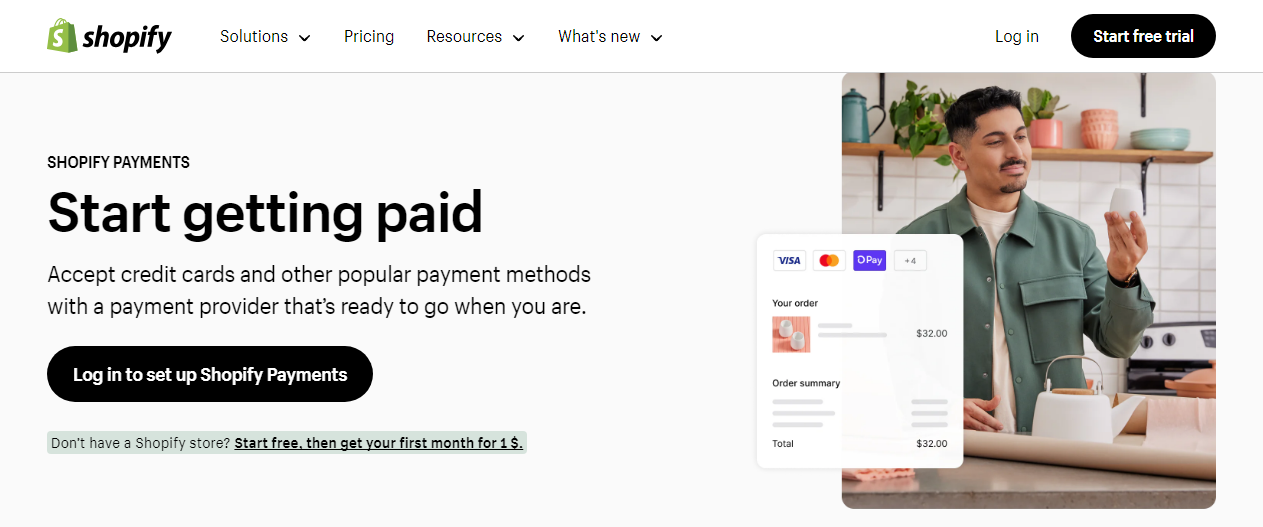
Shopify collaborates with 100 external payment gateways, providing a wide range of payment options to suit various preferences! In addition, Shopify offers its own native payment solution, Shopify Payments, which eliminates transaction fees for built-in payment methods and even cash on delivery.
I'm also impressed with Shopify Payments' “International” feature, which allows your store to sell in multiple currencies. Your customers will enjoy a much better personalized experience that way since Shopify can display product prices in their local currency.
All these features give Shopify the upper hand over Salesforce Commerce Cloud.
To clarify, Salesforce Commerce Cloud does offer Salesforce Payments (as its native payment option and integrates) and integrates with some third-party apps like Chargent for additional payment gateways. However, given its smaller market share, Salesforce Commerce Cloud understandably doesn't have as many partnerships as Shopify.
Mobile Commerce
Both platforms provide a similar user experience (though Shopify has a slightly faster loading speed).
They allow customers to browse products, compare prices, make secure payments, and track orders quickly from their phones! Likewise, using mobile wallets or contactless payment methods on both Shopify and Salesforce Commerce Cloud is hassle-free and very convenient.
The Verdict
Both platforms perform well, but Shopify still wins. As one of the most popular eCommerce platforms, Shopify partners with many payment gateways and even offers native POS features – which Salesforce Commerce Cloud lacks.
4. SEO & Marketing Features (Salesforce Commerce Cloud wins)
No matter how life-changing your products might be, you must promote your store effectively to drive sales! So, without further ado, let's examine the benefits of Salesforce Commerce Cloud and Shopify's marketing features.
Shopify SEO & marketing
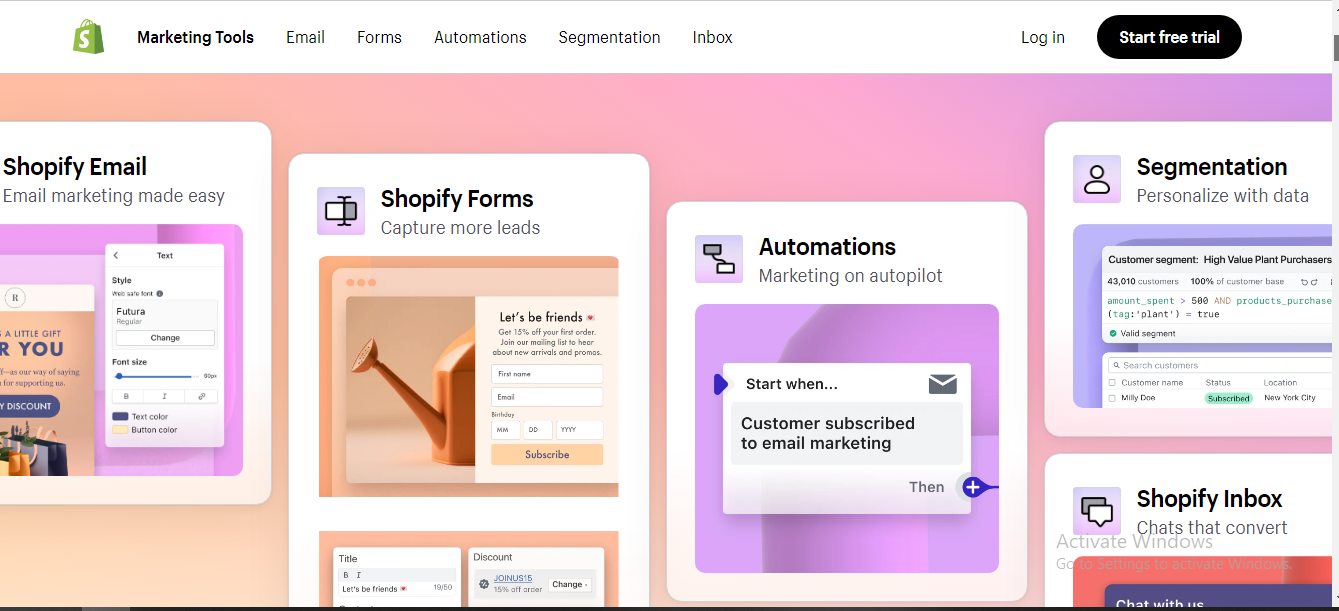
From my observation, Shopify's primary marketing tools focus mainly on automated email templates and customizable platforms.
These templates ensure your customers are cared for at critical touchpoints without your manual intervention! For instance, your store can automatically send a welcome email to new subscribers, customized with the brand's colors and message.
However, Shopify doesn't offer a wide range of marketing functionalities beyond these email templates.
Sure, it does introduce some pretty quality SEO tools, like generating sitemaps or preventing duplicate content problems. But despite this, most store owners prefer to use third-party SEO apps to boost their store's ranking rather than relying solely on Shopify's built-in SEO features.
Salesforce Commerce Cloud SEO & marketing
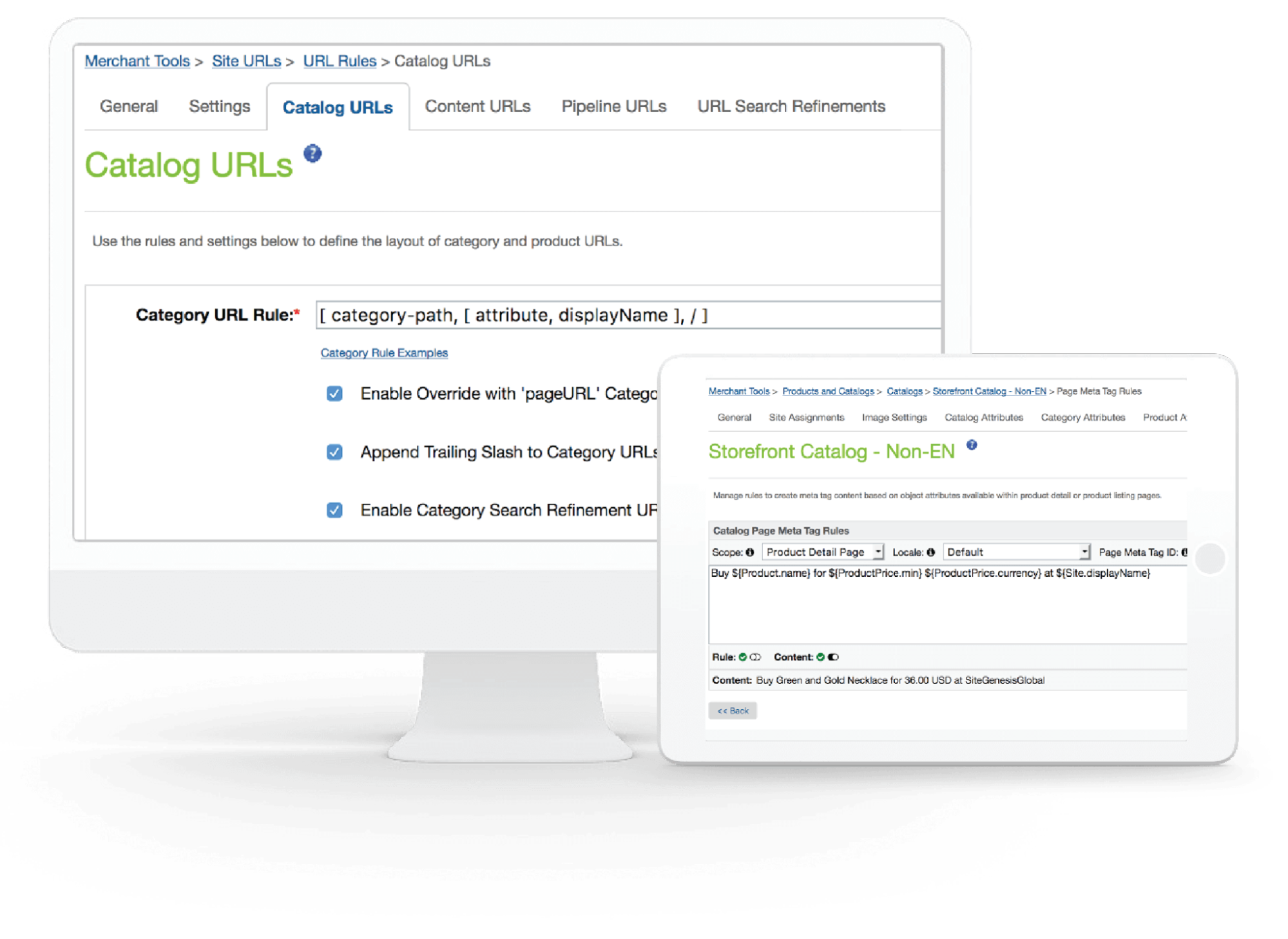
Earlier, we mentioned that Salesforce Commerce Cloud is geared toward larger enterprises. This focus likely explains why its SEO and marketing features are so comprehensive, all desired to ensure your store enjoys the best exposure!
Some notable marketing features of Salesforce are:
- AI-powered personalization for targeted content and product recommendations
- Cross-channel campaign management for a consistent brand message
- Advanced customer segmentation based on behavior and demographics
- Integrated marketing analytics to track campaign performance and ROI
- Email marketing with predictive intelligence for optimizing send times and messaging
- A/B testing different versions of your store to know which one converts better
The Verdict
Shopify’s built-in marketing functionalities are well-received. However, without third-party apps, Shopify’s native marketing features cannot compete with Salesforce’s level.
5. Scalability (Salesforce Commerce Cloud wins)
For years, scalability has always played a considerable role in eCommerce. As your store expands and customer demands increase, your chosen platform should be able to handle the growing business without disrupting your existing setup! That's why we've included this key criterion in our comparison of Shopify vs Salesforce Commerce Cloud.
Shopify scalability

I believe Shopify is one of the best platforms for business growth. Its impressive bandwidth ensures about 99% uptime and integrates seamlessly with existing tech stacks (including ERPs and PIMs and ERPs included).
Nevertheless, there's a drawback: some features and extensions often require collaborations with third-party apps and Shopify Plus Partners. Yes, these partners usually provide valuable functionalities for your store (for example, the famous Kylie Cosmetics uses Shopify Plus to personalize their store management and outlook). But they naturally come at an additional cost – which is something to consider if you're looking to manage your budget.
Salesforce Commerce Cloud scalability

Since Salesforce Commerce Cloud is designed for enterprises rather than solo entrepreneurs (like Shopify), scalability is obviously one of its top priorities! Once contacting Salesforce for pricing, you'll also receive expert advice and support on scalability to help balance budget and sales conversion.
Yes, you might need additional add-ons that come with extra costs, but you'll still benefit from Salesforce's dedicated pricing guidance. Hence, they likely cost less than integrating third-party apps on Shopify.
The Verdict
Salesforce Commerce Cloud is the clear winner if you plan a significant expansion for your business in the future. However, if your goals are more modest (aiming for a mid-sized to reasonably large team), then Shopify is still a good choice.
Further Reading:
- What Is The Difference Between Shopify And Etsy?
- Sell On Amazon Vs Shopify: Key Differences and Benefits for Online Sellers
- eBay vs Shopify: Comparing Selling Platforms for Online Success
6. Templates and Customization Options (Shopify wins)
A visually appealing store is very important; otherwise, customers will not linger long, even if your products are of great quality! Both Shopify and Salesforce Commerce Cloud cater well to this aspect, though their approaches significantly differ.
Shopify templates
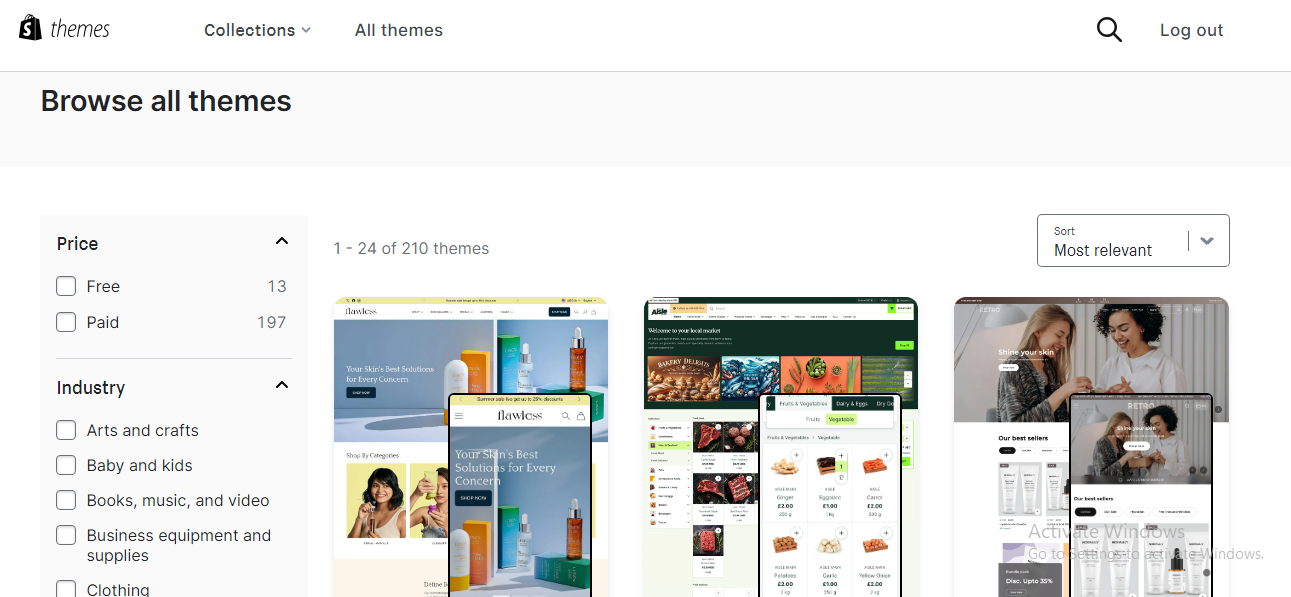
Shopify is a trustworthy, beginner-friendly platform, which is especially evident in its vast selection of pre-made themes!
There are 199 paid themes ($140 to $450) and 13 free ones covering a wide range of categories, from food and drink to electronics. You can filter these themes based on the size of your catalog (from less than 10 products to up to 200 products) and desired features.
Hence, finding a theme that suits your niche needs is very easy. And even if none of these 212 themes meet your needs, feel free to use third-party ones – as long as they are compatible with Shopify’s Online Store 2.0.
Customizing these themes is also a breeze. You can change the fonts, images, header positions, and buttons or even add your own code to the templates! The process is very straightforward, ensuring anyone can create a store that looks exactly how they want.
Salesforce Commerce Cloud templates

I must say I have mixed feelings about Salesforce Commerce Cloud.
On one hand, its customization options are far more extensive than those of Shopify. Given a robust template processor and reference source files, you can tweak your store's design to exactly how you like, down to the most minor details!
Such open flexibility works well for large enterprises with specific or unique customer groups (e.g., luxury brands targeting high-spending clients). Even famous names like Bvlgari have used Salesforce Commerce Cloud to create an elegant, classy theme that highlights their luxury watches.
But on the other hand, these complex customization options can be pretty overwhelming for beginners. Unlike Shopify (where even newcomers can quickly set up a visually appealing store), Salesforce Commerce Cloud requires more time and effort to master.
The Verdict
Although Salesforce gives you complete and unlimited control over your themes, Shopify's pre-made options make things much easier for beginners. Hence, Shopify is the better choice here.
7. Apps and Plugins (A tie)
As your business gradually expands, you'll need additional features and plugins to meet increasing customer demands. The platform's app store is the best place to find these. Let's see how Shopify vs Salesforce Commerce Cloud compete in this area.
Shopify apps and plugins

Frankly, I doubt Shopify will ever lose its spot as one of the eCommerce platforms with the largest app stores.
It offers over 8000 apps (about less than $20/month on average), all thoroughly tested and highly rated! Plus, the app store is very user-friendly, with clear sections like “Trending this Month” and “Popular with Merchants.” You will find it easy to try and install apps that have worked well for other stores similar to yours.
Salesforce Commerce Cloud apps and plugins

As of now, the Salesforce AppExchange offers over 7000 apps at $5 to $100 per month. That might seem a clear disadvantage compared to Shopify's 8000 apps, but I don't see it that way! Just a year ago, Salesforce AppExchange had only 4000 apps, so the increase of more than 3000 is actually quite impressive.
Even better, all these apps are ready to install without extra complicated steps. They come with pre-built templates that you can use immediately, which is a significant improvement considering that many other aspects of Salesforce usually require technical knowledge.
The Verdict
Even though Shopify still has more apps than Salesforce Commerce Cloud, the latter's impressive growth from 4000 to over 7000 apps makes it quite a strong competitor. So, I'd call this round a tie — for now.
Further Reading of Biggest Shopify Competitors:
- Shopify vs WordPress: Comparing Features, Ease of Use, and More
- Difference Between Shopify And GoDaddy: Which Ecommerce Platform Is Better for Your Store?
- Square Pos Vs Shopify Pos: Which Ecommerce Platform Wins?
- Shopify Vs Squarespace Ecommerce: Which Platform Offers Better Features?
8. Customer Support (Shopify wins)
Since not everyone is an eCommerce expert, it's essential to have support from the platform's team when issues arise during setup! I've interacted with both the Shopify and Salesforce support teams and had some comments about their services.
Shopify customer support
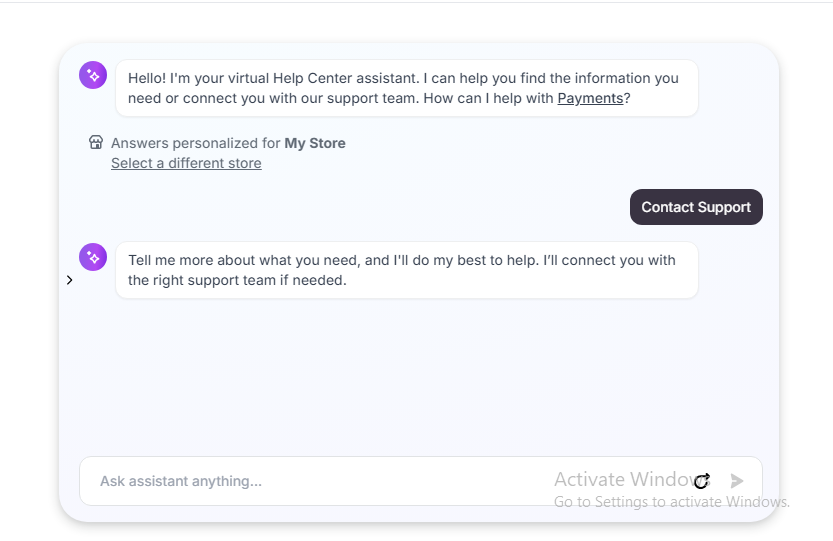
From what thousands of other merchants and I have experienced, Shopify's customer support stands out for its 24/7 live chat support and email! The platform also provides many self-help resources like community forums, comprehensive documentation, and even an academy to help you overcome its more challenging features.
Salesforce Commerce Cloud customer support

Aside from the main business models we've already discussed, Salesforce Commerce Cloud offers three different packages for expert support and guidance:
- Standard Success Plan (self-guided resources)
- Premier Success Plan (expert coaching)
- Signature Success Plan (personalized expertise with the fastest 24/7 support)
As you can see, Salesforce Commerce Cloud provides 24/7 support only for its Premier and Signature Plans. Opting for the Standard Plan means you'll need to learn everything on your own. That is quite a contrast with Shopify, which offers 24/7 support for all its plans, including the Starter package.
The Verdict
Shopify takes the lead. It offers 24/7 support across all its plans, and you can even chat with its live bot before actually subscribing. Meanwhile, Salesforce Commerce Cloud doesn't provide the same level of comprehensive support.
9. Security (Salesforce Commerce Cloud wins)
No matter how well-built your store is or how high it ranks in SEO, it won't matter if hackers can easily ruin all your efforts! Let's look at how Shopify vs Salesforce Commerce Cloud platforms address security concerns to protect your store.
Shopify security
If this comparison happened a few years ago, I would have confidently said that Shopify won in this category due to its full compliance with PCI DSS. That means it promises top-notch protection for cardholder data, including yours and your customers!
However, this year, significant security incidents occurred for Shopify. In March, 25GB of data from 1,800 store plugins were leaked, and just a few weeks ago, information about 180,000 customers was posted to a public forum.
While such incidents are rare, having two occur in the same year might make many store owners question Shopify's security level.
Salesforce Commerce Cloud security
So far, Salesforce Commerce Cloud does not disappoint in terms of security. It fully complies with both the CCPA (California Consumer Privacy Act) and GDPR (General Data Protection Regulation), so data leaks are highly unlikely.
Moreover, data encryption is one of the platform's most robust features!
Salesforce B2C Commerce provides cryptography libraries that allow you to safely generate, sign, and encrypt strong tokens and random identifiers. Better yet, you can use HTTP headers to protect your store from cross-site scripting (XSS) attacks and clickjacking. That's another solid layer of security that keeps your store safe!
The Verdict
Salesforce Commerce Cloud comes out on top in this area. While Shopify used to be on par with Salesforce Commerce Cloud, two big security incidents this year have likely affected its reputation to some extent.
See more Competitors Of Shopify:
- Shopify Vs Shopify Plus Features: Which Version Is Right for You?
- Shopify vs Own Website: Pros and Cons of Each Option
Shopify vs Salesforce Commerce Cloud: FAQs
Is Salesforce similar to Shopify?
No, the two platforms are quite different. Shopify is beginner-oriented and has many pre-set apps and templates that don't require technical knowledge. On the other hand, Salesforce Commerce Cloud targets large enterprises using extremely extensive customization options, which might take some time to get accustomed to.
Why choose Salesforce Commerce Cloud?
Salesforce Commerce Cloud is ideal for enterprises or large teams aiming to scale their businesses and have complete control over their store's appearance and functionality. However, this also means you must have some technical knowledge (or hire someone who does).
Is Shopify best for eCommerce?
Shopify is one of the best eCommerce platforms due to its ease of use, scalability, inclusive features, and strong 24/7 support for online merchants.
Final Verdict
That is the wrap-up of our comparison between Shopify vs Salesforce Commerce Cloud. Shopify (unsurprisingly) comes out on top, but Salesforce Commerce Cloud also offers many attractive benefits!
If you want to migrate to either of these platforms but aren't sure how to, our LitExtension Expert team can help! We know many merchants like you often lack technical expertise, and we aim to make the process as smooth as possible.
Over the past 12 years, we've successfully migrated over 300,000 stores across 100+ countries, and most customers have consistently positive feedback about our service. Plus, our experts are available 24/7, even during holidays, to address any concerns you might have during the migration process.
For more information, check out LitExtension’s blog and join our active Facebook Community for all things eCommerce.

